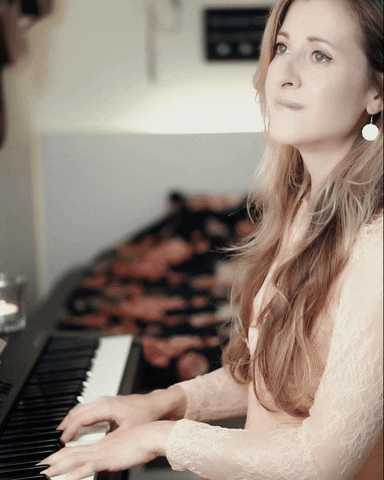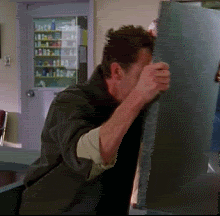


When you’re a young singer, learning to sing is like learning a new language. You have to discover new ways of thinking and talking about your voice that are sometimes bizarre, yet ultimately help you become a better singer. At some point, it seems like you should “arrive”, that these moments of learning will end and you’ll suddenly just know how to sing (instrumentalists, we’re told, also feel the same way!). Congratulations, you’ve made it! However, despite the fact that we have both been held to a high standard of musical excellence since early childhood, we have both been going through challenging vocal development that left us thinking about how sporadic and non-linear development feels as musicians. One moment you’re slogging away in practice sessions, feeling like you’re not making any progress, until suddenly you feel like you have a foothold. Then, you discover something new and now, you’re stumbling through integrating the new discovery. Here’s a glimpse into our latest stumbles and discoveries. If you’re in the midst of the slog or the stumble, just keep going and know you’re not alone.
Do you ever leave a lesson, and think, “My whole life has been a lie?” I have! In fact, it happened again yesterday. I’ve been listening to recordings of myself for the past year and hearing something I’ll call a “vowel wobble”. I don’t know how else to verbalize it, but I’ve known something was not quite right, but I also didn’t know how to verbalize it to any teachers or coaches–until it all started to unravel the other day in the car after yoga class and seeing my physical therapist for persistent shoulder pain. (By the way, if you don’t have a body work practice as a singer, I can’t recommend it enough!) My mind was blown. I thought, “Wait–my body can do that?! You mean I’ve lived in this body for my entire life, and I didn’t even know I could do something so simple!” It’s crazy to me that you can spend months, or even years getting instruction from all sorts of people, practicing for hours while being plagued by a particular problem–essentially chipping away at the impenetrable rock of a specific problem with what feels like a metal spoon, and then suddenly something happens and it’s like a lightbulb turns on and everything changes in a moment. For me, it’s often not even something directly related…sometimes, it’s something my teacher says in yoga class or an audio book or the quality of someone’s voice in a recording I’m listening to triggers some wild connection of neurons in my brain, and Eureka! Everything is different. My voice and I have moved to another planet…now it’s just a matter of integrating it all. Even though reworking my rep with my refined technique feels like I’ve been asked to scrub our town square with a toothbrush, I also know it’s going to be worth it. In some ways, being a singer is like being an archeologist. The process might include hours of brushing away dirt, but the discoveries and rewards make it all worth it.
As I’ve jumped back into my own vocal training, I’ve been thinking about how I go through stages of vocal uncertainty. I’ve experienced this with all 4 of my voice teachers. My teacher tells me something, I try to reconcile how that feeling could be correct when I’ve never felt anything like it before, and then try to make sense of how to sing again. As many can attest, it’s like joining a conversation in a foreign language you’re not fluent in. Sometimes I feel lost. I’ve watched my students go through the same thing over the years; confronting new sensations and ideas with uncertainty and hesitation.
Most recently, my voice teacher and I have been playing with using chest voice in my classical singing. It reminds me of a video in graduate school where mezzo-sopranos and contraltos shared how they never sing in their chest voice. The class laughed and remarked how that clearly wasn’t true and those singers may not understand vocal anatomy. It left me conflicted because while I understood where the class was coming from, I also agreed with the singers. I felt the same way. From a young age in choir, I believed that singing low in head voice was somewhat virtuous. “Look at me, I’m an ideal alto because I can sing low in my head voice.” It was a point of pride.
Over the years, I’ve trained myself to use chest voice when singing pop and musical theater, but I worked hard to avoid it in my classical singing. Then, my teacher began subtly encouraging me to sing with my full voice, including chest voice. All of a sudden, I had to navigate a part of my voice I’d actively avoided. Not only was it an entire mental shift, but my chest voice didn’t know how to operate with classical vowels and tone, let alone blend with my “classical voice” without what felt like massive speed bumps or breaks. It was cognitive dissonance at its finest. For months I felt like I didn’t know how to sing anymore. I remember after one lesson, I was so mind-boggled that I sent Kaitlyn a video just processing everything. Her response stayed with me. “It’s like you’ve been singing with skim milk instead of whole.” This analogy blew my mind. I never realized I was only using part of my voice and was losing richness. My teacher did of course, but I didn’t know how to sing any other way.
So I’ve spent the last few months feeling like I’m relearning how to sing. It struck me how this part of the journey never changes no matter your skill level. One moment I feel like I’ve got this singing thing figured out, then I’m introduced to a new way of thinking and singing and it’s like I’m walking backwards and crashing into objects blindly. Somehow, though, it aligns again. It’s such a crooked journey, and it’s important to embrace the momentary chaos. I’m finally recognizing that these moments of confusion and feeling unsettled are essential to improvement.
While I’m still getting used to this new way of singing, I’m finally feeling like I’m on the upswing after months of struggle. So the next time you find yourself feeling lost and walking backwards, remember that you’ve reached an important turning point, and if you stick with it you will be a stronger, and in my case more whole, singer.
Massive shifts in technique or understanding can be discouraging…traumatic, even. But here’s the thing–we’ve been fed a lie about our musical journeys. Our journeys are not linear. We just continue to develop our instruments. To continue to rebalance our breath, our placement, aspects of our alignment, our tone color…Just like life, our journeys are complex. They’re dependent upon so many factors: the skill of our ears to hear what sound quality our teacher/coach is identifying; of our teacher/coach to communicate what they’re hearing; for us to understand what our teacher/coach has said; for our bodies to execute and integrate what our brains have understood…and then to do it consistently. Rather than thinking about a linear trajectory or “arriving”, we would be much better served to think about our journeys like tending a garden. As seasons change, new things grow and bloom, and last season’s plants may continue or may die. You have to keep weeding, planting, watering, and pruning to keep it all in balance, and the plants in the garden may change, but the goal is that it continues to grow in richness and beauty.
So what are you letting go of or planting in your own singing now? What challenges, or successes, have you experienced lately to improve your performing? We’d love to continue the conversation with you in an email or the comments!
Xoxo,
Kaitlyn + Sarah
Upcoming Performances
Bach Duets & Arias: March 22, time TBA
Sarah Hamilton & Kaitlyn Townsend, mezzo-sopranos & Tracey Schimmel Reed, pianist
Christ Lutheran Church, Staunton, VA
FREE
Bach Around the Clock: March 22 at 8pm
BATC Festival Choir & Paul Weber, conductor (Sarah + Kaitlyn are both singing as members of the choir)
Christ Lutheran Church, Staunton, VA
FREE





